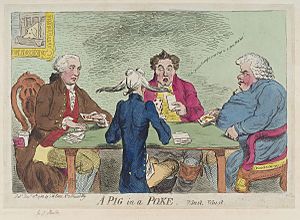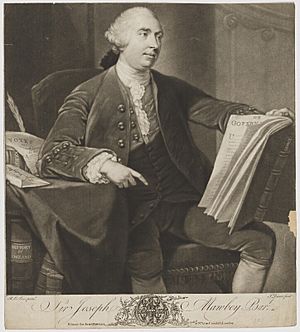Joseph Mawbey facts for kids
Sir Joseph Mawbey, 1st Baronet (born 1730 – died 1798) was an important English businessman and politician. He was a distiller, which means he owned a business that made drinks. He also served in the British Parliament as a Member of Parliament (MP) for many years, from 1761 to 1790. He was a strong supporter of another famous politician named John Wilkes.
Contents
Early Life and Business
Joseph Mawbey was born on December 2, 1730, near a place called Ravenstone in England. He was the youngest of four sons. When he was about ten years old, he moved to Surrey to live with his uncle, Joseph Pratt. His uncle owned a distillery business in Vauxhall.
At the age of 17, Joseph Mawbey joined his uncle's business. He worked there for many years with his brother, John, helping to run the distillery.
Starting in Politics
When his uncle passed away in 1754, Joseph Mawbey inherited land and property in Surrey. This made him a "landed proprietor," meaning he owned a lot of land and was an important person in the area.
In 1757, he became the High Sheriff of Surrey, which was a high-ranking local official. In 1763, he bought a large estate called Botleys in Chertsey and built a big house there. For 25 years, he was the chairman of the Surrey local courts, called "quarter sessions."
Serving in Parliament
Joseph Mawbey first became a Member of Parliament (MP) for Southwark in 1761, serving until 1768, and then again from 1768 to 1774. In 1765, he was given a special title, "Baronet," because he was a political friend of the Marquess of Rockingham.
Supporting John Wilkes
Mawbey was a big supporter of John Wilkes, who was a very well-known and sometimes controversial politician. In 1768, Mawbey helped Wilkes by presenting a formal request, called a petition, in Parliament. This petition talked about some legal issues Wilkes was facing. Mawbey even gave speeches in Parliament about Wilkes, which were later written down and published.
He was also an important member of the Bill of Rights Society. This group gave practical help to John Wilkes. Mawbey took Wilkes's side when there was a disagreement within the society, which led to some members leaving.

Later Elections and Challenges
In 1774, Mawbey tried to become an MP for the county of Surrey, but he lost that election. However, a chance opened up in 1775, and he won the next election for Surrey. He also won again in 1780 and 1784 without anyone running against him.
Even though he claimed to be independent of political parties, he was sometimes made fun of by cartoonists like James Gillray. Later, he became a supporter of the Tory politician Pitt the Younger. In 1790, he lost his seat in Parliament to William Clement Finch.
Later Life and Writings
After 1790, Sir Joseph Mawbey no longer served in Parliament. He passed away at his home in Botleys on June 16, 1798. He was buried in the family tomb at Chertsey Church, where his wife and some of his children were also buried.
Mawbey was also a writer. He wrote a poem called The Battle of Epsom in 1763. This poem was about a meeting held to celebrate a peace treaty. He also wrote some thoughts on the French Revolution.
He wrote a detailed biography of a writer known as "Hesiod" Cooke, which appeared in the Gentleman's Magazine between 1791 and 1797. Cooke had left his writings to Mawbey, so these articles are the most complete story of Cooke's life.
Family Life
In August 1760, Joseph Mawbey married Elizabeth Pratt, who was his cousin. When her brother died in 1766, Elizabeth inherited property. She passed away in 1790, and they had nine children together, though only four were still alive at the time of her death.
His son, also named Sir Joseph Mawbey, became the second and last baronet. The Botleys estate was sold by his family in 1822. Joseph Mawbey also helped his brother-in-law William Alcock's children after William died, making sure they were supported. One of William's sons, Joseph Alcock, later became a Chief Clerk in the government's finance department. Another son, Thomas Alcock, became a military officer and later held an important government position.
 | Lonnie Johnson |
 | Granville Woods |
 | Lewis Howard Latimer |
 | James West |


